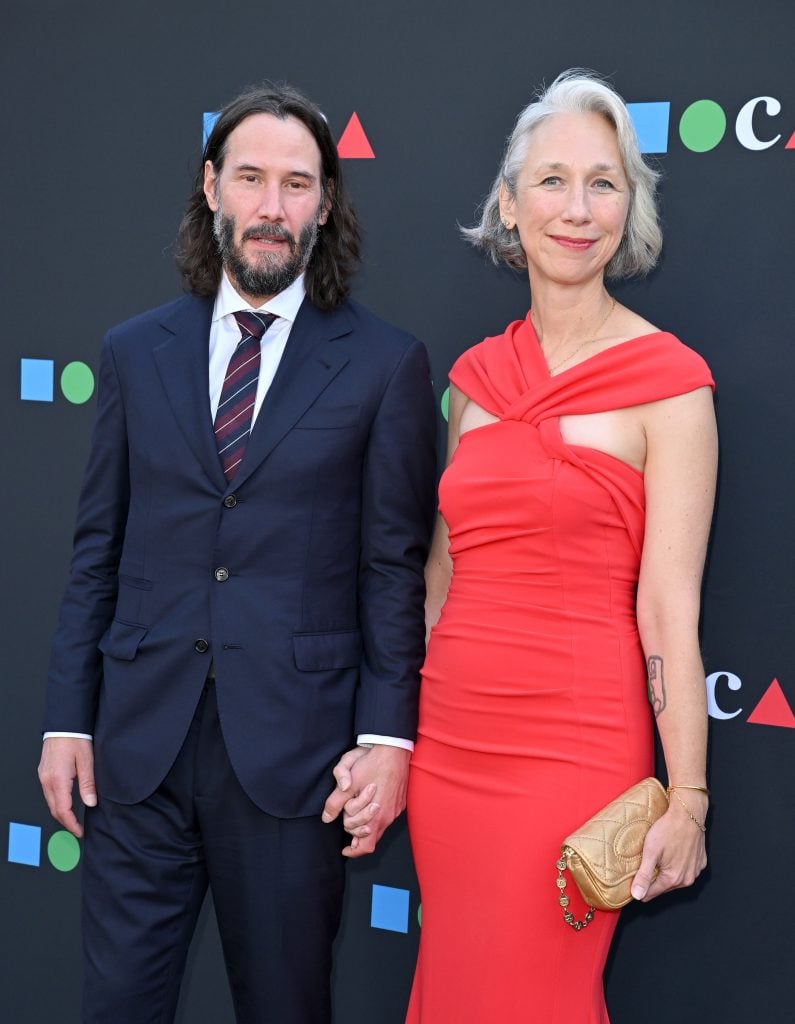The actor Keanu Reeves and his longtime girlfriend, artist Alexandra Grant, are teaming up to advise the new charitable initiative Futureverse Foundation, which aims to empower the next generation of artists through the use of blockchain technology and web3.
As an outgrowth of Non-Fungible Labs and FLUF World, a New Zealand-based NFT studio, the Futureverse Foundation plans to support projects by using an internal nomination process. Grant and Reeves say they hope to fund approximately five to 10 projects per year.
“Our mission is to explore how the technology of web3 and the metaverse can support communities coming from diverse backgrounds,” Grant told Artnet News from her Berlin studio last weekend. “We are in the very early planning stages, but I believe that what we are doing will really have a positive impact on artistic philanthropy in the months and years to come.”
Grant, who has long explored the intersections of language and visual culture, said she hopes the new foundation will support her existing philanthropic and publishing efforts. With Reeves, she runs the Los Angeles-based imprint X Artists’ Books, which recently published an edition for Asad Raza’s exhibition “Diversions,” which opened June 25 at Protikus in Frankfurt, it features a diverse set of contributions from the likes of Tacita Dean, Liberty Adrien, and Sophia Al Maria, among others.
Reeves said in a statement that he hopes the new initiative will support artists from diverse communities. “I am honored to be joining Non-Fungible Labs’ efforts in cooperation with Alexandra Grant for the extraordinary program and opportunity of the Futureverse Foundation, in support of artists and creators globally.”
“It’s important to us that we do our charitable part and use our influence to inspire the collective to be generous and kind,” said Brooke Howard-Smith, co-founder of FLUF World, in a statement. “Partnering with a renowned philanthropist like Alexandra Grant is the first of many incredible initiatives we hope to embark on to create a better future for artists everywhere.”
Recently, the Futureverse Foundation supported curator Nana Oforiatta Ayim with €100,000 ($104,500) for her concept of a mobile museum in the Ghanaian Pavilion at this year’s Venice Biennale. Projects need not involve NFTs or other digital components to qualify for funding. Rather, the aim is to work blockchain to provide transparency in how funds are distributed.
“What we are trying to do is show how blockchain technology and the world of crypto can be used to create new forms of economic agency,” Grant said, beyond the “entitled” Elon Musk types.
Grant said she also hopes to educate those who may be suspicious about the blockchain and crypto spheres, and whether they can really be used to support critical and community-driven art projects, which are so often marginalized by the art market.
“By tapping into new forms of philanthropy, we’re hoping to alter the landscape of structural support in the arts in a way that shows how technology and art can elevate artists at pivotal moments in their careers,” she said.
Ideally, the Futureverse Foundation will help transform traditional funding models toward a more “circular economy,” not only in the art world, but also in entertainment, film, and music. “When I’m not fundraising, I’m friend-raising,” Grant said.
“The Futureverse Foundation is a work in progress,” she added, “one that I hope will establish more horizontal and fair working conditions for artists and cultural producers from a wide variety of different geographical backgrounds.”






